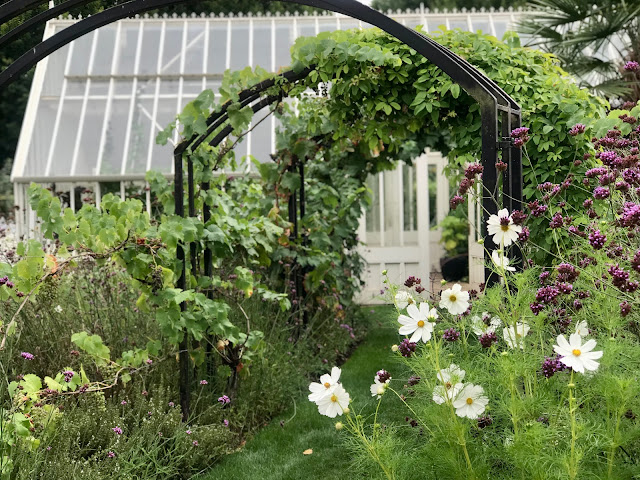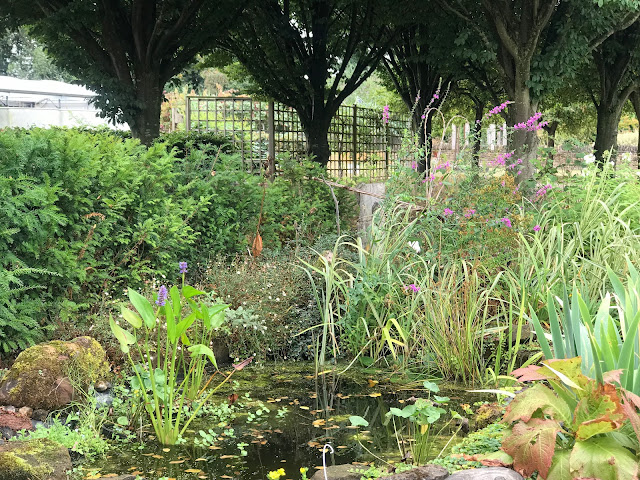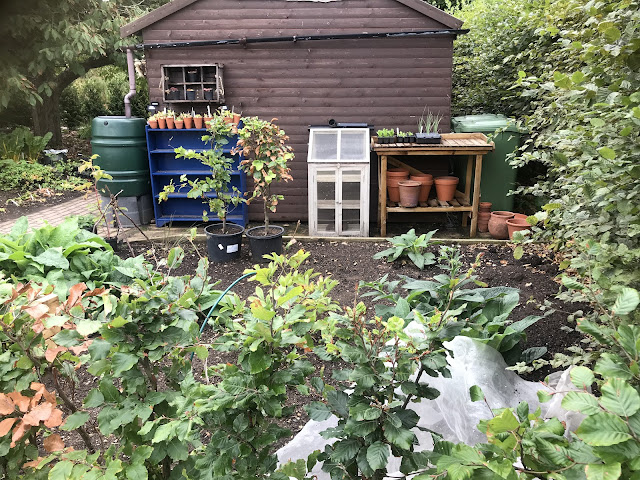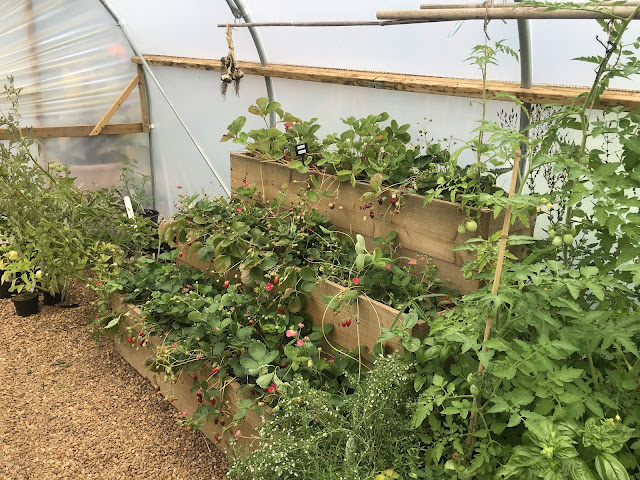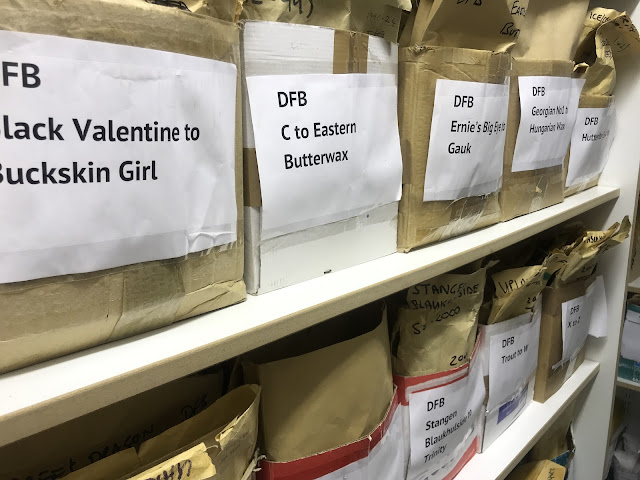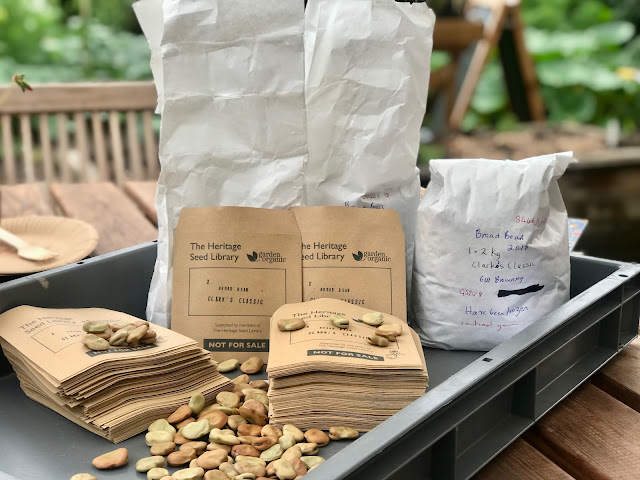My ideas about gardening and the food we were eating changed when we had small children. One of my neighbours' garage held everything to kill things - weeds, ants, rodents, you name it, there was some toxic product to keep the garden pristine and repel all invaders.
That wasn't going to happen under my watch in our small garden, and I began reading about growing organically, which I've done ever since.
So, a few weeks ago, I was delighted to be at Garden Organic, near Coventry for a Garden Media Guild visit.
This is the home of the UK charity formerly known as the HenryDoubleday Research Association, which encourages organic gardening and growing food in a healthy and sustainable way, carries out scientific research into the best ways of doing so, and preserves heirloom seeds for posterity.
The organic show gardens that we see now were only created over two years ago, designed around a beautiful glasshouse and framed prettily by cosmos and verbena bonariensis. Our guide is the wonderfully enthusiastic Head Gardener Emma O'Neill.
Inside, tomatoes, chillies, aubergines, melons and other heat-loving vegetables are grown in pots.
Outside, the glasshouse is surrounded by four beds, one a perennial vegetable bed which includes skirret. This is new to me, but apparently, it dates back to Tudor times and its flavour is somewhere between a potato and a parsnip.
One bed is trialling the no dig method, and another features legumes, with heavy cropping beans climbing over archways.
Beans are one of my favourite things to grow, so I made a beeline for them and was intrigued by one variety of runner bean "Slovenian White" Such delicate white flowers, so vigorous too, and when I saw some of the actual beans, they're large, bright white, and used primarily as a dried bean for soups and stews.
As we walk around, Emma is a mine of information and is very honest too, telling us how she's been having problems with the brassicas due to the heat, what plants have irritated her and why. This is the way to learn about growing plants, to hear of the failures as well as the successes,because it can be all too easy to be despondent at home when something goes wrong, As Emma says, you can always try again, using a different approach, or use the advice pages on the Garden Organic website.
Emma is proud of the ponds which have been established in the last two years, attracting all sorts of pollinators and the bug hotels around have attracted both bugs and children who are fascinated by them. After all, you are never too young to learn about organic gardening.
As you enter the polytunnel, there's the addictive scent of strawberries, so intense I want to snatch handfuls of the juicy fruits to eat, but I resist the urge and just admire them, as well as the very well-behaved tomatoes.
Organic gardening isn't just about growing food to eat of course and Emma O Neill loves her ornamentals too.
After a quick lunch, (we all brought our own) we were off to learn more about the work of the Heritage Seed Library, which I found absolutely fascinating. Catrina Fenton is Head of the Library, and she's passionate about her work and why it is so important.
Apparently, we've lost thousands of varieties of traditional varieties of vegetables in the last fifty years or so. Catrina explains the introduction of intensive farming and EU rules introduced in the 1970s, meant the trade of seeds that had not been through an expensive registration process was restricted, which led to the extinction of heritage varieties.
That's where Lawrence Hills, the Founder of the Library stepped in. He realised that these old varieties needed to be protected, and since then, seeds of all sorts have been collected, sent or donated by growers who treasure the diverse range of varieties.
Each year, new ones arrive, and they are all trialled in the grounds at Garden Organic, in open ground, polytunnels and glasshouses.
Firstly we went into the polytunnels, one of which was bursting at the seams with what looked like tall triffids, they were so lush and energetic, but they were Shropshire blackpods, an heirloom variety of runner bean grown by the same famiy for at least 100 years, plus Mr Wong's Shark Fin melon.
In one of the glasshouses, plants were drying out ...such as this Rousham Park Hero variety of onion, which was bred in the 19th century in Oxfordshire.
Meanwhile in the seed cleaning room indoors, Lucy the Seed Officer, oversees all the thousands of harvested seeds that arrive in here, including 3 to 4,000 tomatoes which come through the door. There's a winnowing machine, tomato seeds
The results are kept in cold storage, in a room which houses thousands and thousands of treasures - heritage seeds of tomatoes, beans, peas, cauliflowers, carrots, squashes, you name it, filled with seeds which need to be protected.
Many have weird and wonderful names which delight, and every packet of seed tells a story of gardening history, the people who grew them and a sense of place. These seeds can come a local grower, or from Europe and further afield, or from people who have come to live here but brought a taste of home with them. For example a seed search was conducted by Garden Organic back in 2012 across allotments in the the Midlands, to find seed originated from India. Again, these are an important genetic resource maintaining heirloom varieties.
Before the end of out visit, we sat undercover in the Demonstration Garden, and over a chat, we made ourselves useful. Some of us, were podding dried beans with Fiona Taylor, the charismatic Chief Executive of Garden Organic...
and the rest of us, were packing broad beans into packets, ready to be sent out to members of the Heritage Seed library early next year. Members of Garden Organic can join the Heritage Seed Library for an extra £18 and select six packets of seed from over 150 different types of vegetables in a catalogue which plops throught the door in early December.
I drove home from the visit with my mind buzzing with visions of upping my own seed saving game, what to grow next year and planting methods and ideas which are so relatable not just to my garden but so many others.
There was also the sense of just how valuable Garden Organic is, in a world of unprecedented global, environmental change and challenges.
The garden and Heritage Seed Library is open regularly to the public and pre- booked tours and workshops. Visitors are offered a guided tour and expert advice on organic gardening. Scheduled tour days are free for members and cost £7.50 for non members.
Groups can also book a private tour ...call 024 7630 3517

